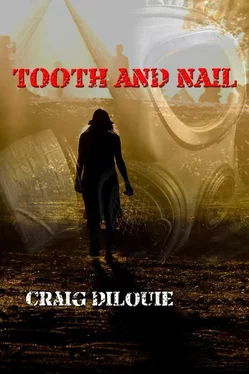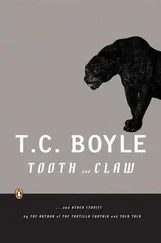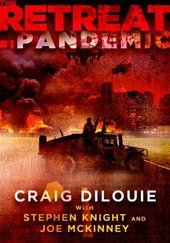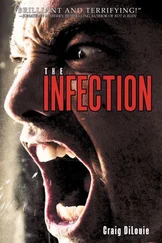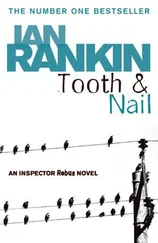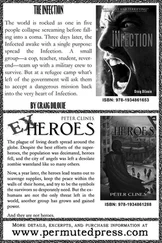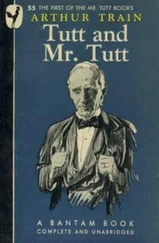The soldier nods. “Right. Okay. Thanks.”
Mooney notices that the soldier’s left eye is twitching.
“Any, um, other last requests?” says Wyatt.
“No, I’m good,” the soldier says, walks into the classroom, and approaches the window, looking out into the sunshine. He breathes deep and says, “I’m telling you, it sure is—”
Mooney has already begun to close the door. Wyatt passes him a handful of nails, which he hammers into the edge of the wood door to secure it to its frame.
The survivors trickled in all night and the next day, telling their horror stories. Half of them were bitten but had nowhere else to go. The LT did not want to kill them or turn them out so he came up with the idea of converting part of the school’s west wing into an asylum.
Wyatt raises the plundered surface of a desk and Mooney begins hammering until it covers the bottom half of the door and its frame. Once the door is completely covered, Mooney nails one of the soldier’s dog tags into the wood—name, rank, serial number, blood type and religious preference—while Wyatt scrawls the boy’s name with a pen knife.
Mooney waits patiently until Wyatt is done carving. He can hear the Mad Dogs in the other classrooms pacing and growling. They were soldiers once, these lost boys. This is where they turned, and this is where they will eventually die and be entombed.
Wyatt picks up his carbine and says, “Let’s get out of this freaking zoo.”
“You say that again and I will take you out, Joel.”
Wyatt smiles but says nothing.
Mooney pauses to touch the name Wyatt carved into the wood, struggling through his exhaustion to commit the boy and his paltry details to memory.
PFC James F. Lynch has blood type A and is a Christian, no denomination.
The real problem isn’t people leaving the Army. . . .
The real problem is the Army leaving us
Sergeant Pete McGraw glides his thumb over the rabbit’s foot in his pocket, his personal talisman given to him by his wife before his first tour in Iraq and her death in a car accident on an icy bridge in Maryland months later. The smooth fur of the rabbit’s foot comforts him. After everything he has seen and been through in three tours of duty in Iraq and now this bag of dicks, he firmly believes luck and Margaret’s spirit watching over him are the only things standing between him and oblivion. In his other pocket, he fingers a bent bottle cap he kept on a whim from the first beer he ever had with his girlfriend Tricia, a slim blonde beauty with braided hair down to her waist who shares his passion for hard drinking and motorcycles, among other things. He wears a medal engraved with an image of St. Michael, patron saint of soldiers and cops, on a chain around his neck, next to his dog tags and a 7.62-mm bullet. The bullet, the type of round used in AK47 assault weapons, is the bullet that was going to kill him back in Iraq, and as long as he wore it, it couldn’t fulfill its purpose.
From here on out, he is going to need all the luck he can get, seeing how the world is ending.
He falls in with the other NCOs cramming into the school principal’s offices, an open workspace and lobby with several adjoining private offices that Bowman established as his headquarters. The men nod to each other as they enter, smelling like sweat, gun oil and stale cigarette smoke. A sergeant that McGraw knows from First Platoon catches his eye and gives him a courteous nod, and McGraw wonders at how quickly things change. Just two days ago, the other NCOs were looking at him and his squad like they had blood on their hands and swastikas tattooed on their foreheads. Now they regard his boys with something like respect. His boys popped their cherry in this war early. But if he is getting respect, the NCOs from the other companies who survived the massacres are looked upon with something like awe. They went to hell and back and survived.
The non-coms gather around 2LT Bowman, who stands with his hands on his hips next to a large tourist map of Manhattan, complete with callouts of businesses such as Barnes & Noble and Burger King, thumbtacked to the wall. The RTO pushes his way through the bodies, races into one of the private offices, and slams the door. Knight and Bishop come out of one of the other offices and hustle to Bowman’s side. Kemper is shading Staten Island and Battery Park red with a Magic Marker. Bowman is already greeting them in a quiet voice, and McGraw can’t hear him.
The sergeants blink in the fluorescent light and sip their lukewarm coffee, bags under their eyes and carbines slung over their shoulders, murmuring to each other. Sergeant Lewis is sharing some of his chaw. As Bowman finishes his welcome, they settle down to listen. McGraw does a rough headcount; there are so many NCOs in their unit now that the crowd spills out into the hall. Some he recognizes from the other platoons of Charlie Company, others are survivors from the massacre of Alpha, Bravo and Delta. These are the best men the Army has, McGraw thinks. The lifers. They are the bedrock of the Army, these modern-day Centurions. It takes years to make one of these men, and once they are gone, they cannot be replaced.
All of them now report to a young second lieutenant who happens to be the most senior officer alive in the entire battalion. McGraw watches him and thinks: We’re lucky the man’s competent. It could be much worse. They could have Knight, who is only nominally still in command of Third Platoon, or Bishop, the type of officer who risks lives to advance his career. McGraw has been hearing rumors that Bishop has been telling some of the NCOs that he wanted to lead a party out to try to help the other companies during the massacre. The sooner LT gets him squared away, the better.
“Jake has been combing the nets to come up with a list of assets and threats,” Bowman says. “Mike has been marking them on this map. If we’re going to survive, gentlemen, we need information.”
The NCOs periodically stand on tip toe to improve their view, squinting at the map. McGraw sees a series of colored circles, squares, long smears and triangles littering the length of Manhattan and the river coasts of the boroughs and neighboring states. It is pathetic. In just a few days, the Army has lost control of most of New York City and its population of more than eight million. The color-coded geometric shapes float on the map like islands in an ocean.
We really do have our backs up against the wall, he realizes.
Bowman traces his finger across the map and stabs a red square at Battery Park.
“This here is actually what’s left of a mechanized infantry brigade of marines sent to reinforce Warlord before Command decided against it,” he says. “They’ve got two platoons at Fort Clinton and the rest are stationed in Staten Island, which used to be Twenty-Seventh Brigade’s responsibility. After the government here collapsed, Colonel Dixon declared martial law and cleared Staten Island of Mad Dogs.”
Some of the sergeants grin and nudge each other.
“They, uh, do like to take the initiative, so I hear, sir,” Kemper says, making the men laugh.
“Yeah, well, Manhattan’s got a hell of a lot more people than Staten Island,” Hooper says, reminding them that they work for a rival branch of the military and not to give the jarheads too much credit for anything.
“I could get some work done around here if I had some LAVs, too,” another sergeant says.
“Hooah,” somebody mutters.
“Give me some Bradleys and about thirty bulldozers, and I’ll unfuck this island double quick,” somebody shouts from the back, and the NCOs cheer.
“The Marines have got their own problems,” Bowman says loudly, regaining control. “The only reason the Marines are on Staten Island to begin with is it was being used as a staging point to reinforce us here in Manhattan. The boats dropped off two platoons in Battery Park, then the Brass called off the game and the units ended up stranded. Now they’re effectively cut off from their main force and they are not being resupplied.”
Читать дальше
